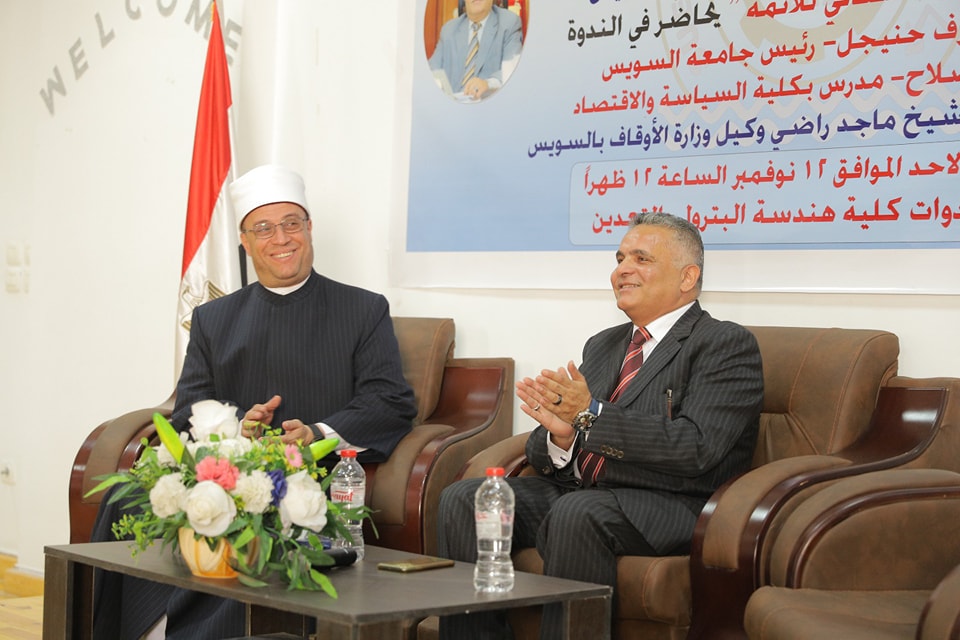▪︎ “The SU President,” it is necessary to keep up with the youth and understand their language to facilitate communication with them
▪︎ “Hnijal” The political leadership’s interest in imams and preachers reflects the importance of their role in enlightening minds
This morning, a seminar entitled “The Cultural Construction of Imams” was held at the conference hall of the Faculty of Petroleum and Mining Engineering. It was conducted under the auspices of General Staff/ Abdelmadjid Saqr, the Suez Governor, and Prof. Dr. Ashraf Hnijal, the SU President. This seminar was attended by Shaikh Majed Radi, the undersecretary of the Minister of Awqaf in Suez, and Dr. Hamada Salah, the Lecturer of the SU Faculty of Politics and Economics.
Moreover, this seminar began with a national anthem and read verses from the Holy Quran. After that, the SU President delivered a speech expressing his pleasure at this event, which was to train and refine the skills of religious figures. This meeting is one of the University's inherent duties to fulfill its enlightenment role in all parts of the surrounding society.
He pointed out the specificity and uniqueness of this symposium because it is aimed at a segment that assumes the task of enlightening and shaping the consciousness of the Egyptians by spreading the validity of religion, correcting misconceptions about our religion, adhering to its moderate centrist approach, addressing overwhelming extremism and confronting deviant thought, and upholding human, moral and loving values among all people.
Furthermore, Hnijal stressed that the sacred duty of religious figures occasionally needs pauses for self-development and skills development, to keep abreast of every new age marked by the steady speed that makes it necessary for all to develop and develop their abilities and skills.
Then, El-Shaikh Maged Radi, the undersecretary of the Minister of Awqaf in Suez, thanked the university for hosting this symposium and expressed his gratitude to His Excellency the President for his eagerness to give this lecture himself, noting his assurance Prof. Dr. Mohammed Mukhtar Goma, the Minister of Waqf, stressed the need to take all measures and hold various events to develop the capabilities of the Awqaf imams.
The "President" then presented a presentation entitled Technological Development and Challenges, during which he reviewed the talk about the importance of scientific research and ethics, youth language, media, and information circulation, updating the language of imams to fit the language of the youth, and then the subject of artificial intelligence and its applications.
He explained the importance of scientific research and its benefits to society in various sectors, noting that scientific research has frameworks and ethics governed by the most important of which is to investigate accuracy and honesty in all steps of research.
The president then explained that the language of youth and media needed to be kept up to date, noting the development that had taken place in the field of communications and information technology, and the evolution of communication generations.
Hnijal then talked about the importance of developing imams' skills and understanding young people's minds to keep up with their minds and understand what is going on in their minds to facilitate dealing with them.
The "President" concluded his lecture by emphasizing the pivotal and significant role played by religious figures in shaping the awareness, perception and understanding of the nation, and noted the great attention that political leadership attaches to the issue of awareness of the citizen and all those involved.
The second part of the symposium then began with a lecture by Dr. Hamada Salah, economics teacher at Suez University, gave a lecture entitled "The Egyptian economy between reality and hope". He pointed out that the Egyptian economy had gone through periods of delay during the 2011 revolution, and then began to recover due to the economic actions carried out by the Egyptian state with the certification of all international economic institutions.
He explained that the rate of economic growth had risen from 2. 9 in 2014 to 6. 6 in 2022, the budget deficit fell from 13 to 8% and net investment flows from 5 increased. 2 to 8. $6 billion, according to reports from the world's most prestigious economic institutions.
The attendees expressed their pleasure at this distinguished lecture and paid tribute to the University and its President for organizing this important event.

